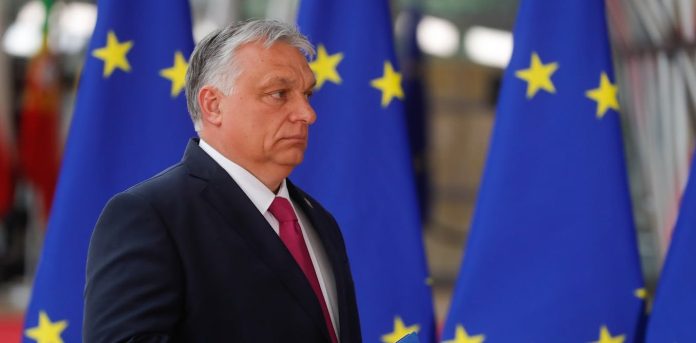Why has the EU stripped Hungary of €1 billion? The latest confrontation explained
The European Commission has stripped €1.04 billion in aid from Hungary in the latest phase of an ongoing political struggle with its errant member state.
The amount of money lost is a blow for Hungary, but the decision also has wider economic and geopolitical implications. Hungarian prime minister Viktor Orbán has consistently flouted EU standards and democratic principles. The question now is whether he has run out of options.
The European Union mobilises and redistributes a vast amount of collective funding to its poorer countries and regions. Since the 1970s, a complex set of funding instruments has emerged under the banner of “cohesion policy”.
For the 2021-27 budgetary period, the EU has allocated €392 billion for cohesion policy, supplemented by €750 billion in grants and cheap loans from the Next Generation EU programme. These funds can be used for the development of infrastructure, environmental protection and support for the private sector (in particular for the green economy).
No other regional institution does anything like this. For poorer countries, these funds can amount to a significant proportion of GDP, and distributing such a large pot of money gives latent power to the European Commission.
The EU is also noteworthy as an institution in that it makes support for democratic values and the rule of law a prerequisite for membership to its club. It considers itself a bulwark of liberal values and constitutionalism: there is not supposed to be any room at the table for authoritarians.
However, the EU was slack in enforcing this rule with Orbán. After he came to power in 2010, the Hungarian prime minister began to institute various repressive and cronyist measures that boosted his personal power and that of his governing party (Fidesz).
Orbán was even accused of directly using EU funds for these purposes. He was protected for some time by membership of the powerful European People’s Party (EPP) in the European parliament and developed his own form of populist Euroscepticism, while raking in money from Brussels.
Eventually, he went too far and alienated his erstwhile allies (leaving the EPP group in 2021), as the commission began to take measures against him.
In 2020, the European Commission introduced the rule of law conditionality mechanism, which made it much easier to suspend or withdraw funds from member states if there are concerns about their commitments to democracy. This was used against Poland and Hungary in 2022. Just to give an idea of the stakes, the former had a total of €136 billion unblocked when its new government agreed to Brussels’ terms.
Hungary also had over €30 billion frozen over the same period. A game of cat and mouse continued, with Orbán threatening and occasionally using his national veto to frustrate European Union action in support of Ukraine. In December 2023, €10.2 billion of cohesion funds were unfrozen, in a rather tortuously worded decision, just before a crucial vote on Ukraine aid and accession. Another €20 billion plus was still withheld, however.
A commission report on the rule of law in Hungary in July 2024 noted that Orbán’s government had made some reforms (under pressure) but still noted systemic problems around issues such as judicial and media independence.
At that time, Hungary also held the EU presidency (which rotates every six months). Orbán was using this position to promote himself on the world stage, visiting Moscow and Beijing to sell a different “European” view and further annoying the EU leadership.
Next moves
It should be noted that the decision to strip Hungary of its €1.04 billion is in some sense a technical issue. Funds are automatically withdrawn two years after the suspension starts. But it is nevertheless highly significant as it implies that the status quo will not continue. Without change, Hungary could lose the rest of the funds permanently.
The implications of this are manifold. The EU had been accused of tolerating authoritarians in its midst, but this is clearly changing. However, it is changing at a time when more and more nativist populists are coming to power in the EU.
Can the commission maintain its rigorous approach or will pressure from governments soften it up? Donald Trump is a warm ally of Orbán, but it’s not certain that he would be willing or able to help Hungary in this form of dispute. If he does try, that would be a sign that there is some substance to the idea of a global nativist populist alliance.
Orbán himself has reacted angrily to this loss of funds and has threatened to use his national veto more aggressively – which he has threatened to do in the past. Hungary is in an economically fragile position so it is not clear how much of a confrontation he can afford.
Meanwhile, opposition to Orbán is growing within Hungary and the rising opposition leader, Peter Magyar, has declared that he can “unlock” the billions of EU funds still due. This could be a potent election slogan (the next ones are due in 2026). It would also amount to the EU entering Hungary’s domestic political sphere in a very tangible way.![]()
Patrick Holden, Leader of the Online Masters in International Relations : Security and Development, University of Plymouth
This article is republished from The Conversation under a Creative Commons license. Read the original article.



